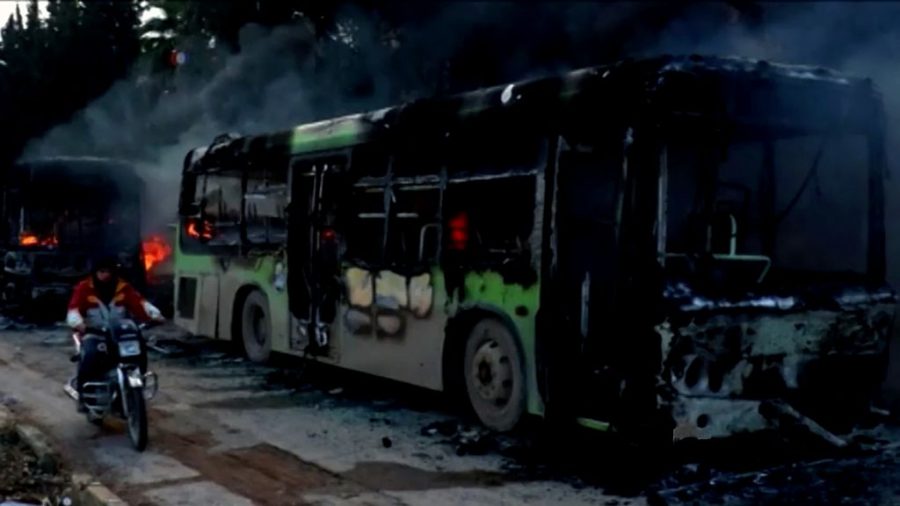Syrian government recaptures city of Aleppo
Photo via Google Creative Commons License
Burnt-out buses were meant to transport civilians and rebel fighters out of Aleppo.
January 26, 2017
The civil war in Syria came to a turning point on Dec. 11 and 12 when Syrian President Bashar al-Assad’s forces laid siege to the city of East Aleppo, a stronghold for rebel forces and anti-government civilians. Anti-government forces have been fighting against the government’s corruption and lack of freedoms.
The civil war started in 2011 when 15 young boys were tortured for expressing their support for the Arab Spring movement. Civilians peacefully protested the government’s actions. Their actions were met with imprisonment of death at the hands of al-Assad’s forces.
“The problem was that while Assad gave the people some kind of freedom, it was followed by a strong, fatal blow,” Syrian activist Ahed Zarzour told Aljazeera Staff. “Political and cultural forums, where Syrians could debate freely for the first time in four decades, were shut down. Where we had once been full of hope and high expectations, we suddenly became terrified.”
The conflict came to a head with the recapture of Aleppo in early December, which placed anywhere from 250,000-275,000 people in danger. But even before the final siege, Aleppo and its residents were in grave danger.
“The ancient city of Aleppo, a place of millennial civility and beauty, is today a slaughterhouse – a gruesome locus of pain and fear, where the lifeless bodies of small children are trapped under streets of rubble and pregnant women deliberately bombed,” Zeid Ra’ad Al Hussein, the UN High Commissioner for Human Rights, told the Security Council in a letter published on the UN’s website on Oct. 21, 2016.
To date, about 600,000 Syrians have died in the conflict and approximately 11 million have been forced to flee their homes and seek asylum in other countries.
On Dec. 11 civilians began posting goodbyes to the world on social media in case they didn’t survive the attack. Many called on other nations to do something to alleviate the humanitarian crisis.
UN Secretary-General Ban Ki-moon told the Associated Press that the UN had received “credible reports” of civilians being killed by intense bombings and on-the-spot executions by government forces on Dec. 14.
Many nongovernmental organizations (NGOs) became helpless under the relentless bombings, with no functioning hospitals available to civilians and rebels alike. Reports of women committing suicide to escape mass rape at the hands of the government also emerged.
“The airstrikes are relentless,” American journalist Bilal Abdul Kareem wrote on Aljazeera.com. “They operate using a ‘double tap’ method that is designed to kill any good samaritans who come to the aid of the injured. They strike once then wait a while; then, when people gather to try to remove those stuck under the rubble, they strike again.”











